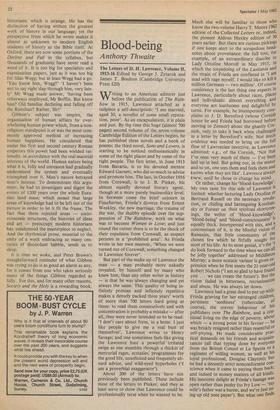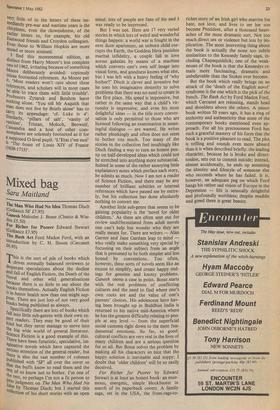Blood-being
Anthony Thwaite
The Letters of D. H. Lawrence, Volume II, 1913-16 Edited by George J. Zytaruk and James T. Boulton (Cambridge University Press f20) writing to an American admirer just before the publication of The Rain- bow in 1915, Lawrence attached as a tailpiece a self-description: 'I am married, aged 30, a novelist of some small reputa- tion, poor'. As an encapsulation, it is plain and just. By the time this huge (almost 700 pages) second volume of the seven-volume Cambridge Edition of the Letters begins, he has published three novels and a book of poems; the third novel, Sons and Lovers, is starting to be noticed enthusiastically in some of the right places and by some of the right people. The first letter, in June 1913 from Bavaria, is to his devoted mentor Edward Garnett, who did so much to advise and promote him. The last, in October 1916 from Cornwall, is to J. B. Pinker, his almost equally devoted literary agent, though at a more purely businesslike level. In between come the brief sojourn in Fiascherino, Frieda's divorce from Ernest Weekley, the new marriage, the trauma of the war, the shabby episode over the sup- pression of The Rainbow, work on what was to become Women in Love; and just round the corner there is to be the shock of their expulsion from Cornwall, as suspect persons in a 'prohibited area'. As Frieda wrote in her own memoir, 'When we were turned out of Cornwall, something changed in Lawrence forever'.
But part of the make-up of Lawrence the man — a man probably more nakedly revealed, by himself and by many who knew him, than any other writer in history — is that he was always changing and yet always the same. This quality of being in- finitely protean and infinitely repetitive makes a densely packed three years' worth of more than 700 letters hard going at times: to read them consecutively and with concentration is probably a mistake — after all, they were never intended so to be read. 'I don't care about form, in a letter. 1 just like people to give me a real bust of themselves', Lawrence wrote to Henry Savage; and one sometimes feels like giving the • Lawrence bust a powerful irritated swipe as one stumbles through a thicket of mercurial rages, ecstasies, programmes for the good life, unsolicited and frequently ab- surd advice, and wild-eyed hyperboles CI am a proverbial exaggerator').
About 200 of the letters have not previously been published. These include most of the letters to Pinker, and they at least serve to show that Lawrence could be professionally terse when he wanted to be.
Much else will be familiar to those who know the two-volume Harry T. Moore 1962 edition of the Collected Letters or, indeed, the pioneer Aldous Huxley edition of 30 years earlier. But there are curious pickings if one keeps alert to the scrupulous head- notes about provenance: the full text, for example, of an extraordinary diatribe to Lady Ottoline Morrell in May 1915, In which the torpedoing of the Lusitania and the strain of Frieda are conflated in '1 am mad with rage myself. I would like to kill a million Germans — two million'. Of course consistency is the last thing one expects in Lawrence, particularly about races, places and individuals: almost everything and everyone are loathsome and delightful by turns. For example, he intemperately com- plains to J. D. Beresford (whose Cornish house he and Frieda had borrowed before moving to Zennor) about the ghastly Cor- nish, only to take it back when challenged in a letter by Beresford's wife. Not much evidence was needed to bring on the full flow of Lawrentian invective, as Lawrence admitted: e.g., of the Cornish, 'Not that I've seen very much of them — I've been laid up in bed. But going out, in the motor and so on, one sees them and feels them and knows what they are like'. Lawrence always knew, until he chose to change his mind. , Or rather, change his `blood-knowledge.• My own taste for this side of Lawrence Is limited: whether lecturing Lady Ottoline or Bertrand Russell on the necessary revolu- tion, or chiding and haranguing Kotehan- sky or Forster on their spiritual shortcorn- ings, the welter of 'blood-knowledge., `blood-being' and `blood-consciousness' Is equally thick. Interspersed with this, and a concomitant of it, is the blissful vision of Rananim, that little community of the chosen few which he fitfully sought for ! most of his life. At its most genial, it's the do look forward to the time when we can all be jolly together' addressed to Middleton Murray; a more ecstatic variant is given ex- pression when he first meets the 21-year-old Robert Nichols (1I am so glad to have found you ... we can create the future'). But the vision faded in bitterness, recrimination and abuse. He was always let down. Lawrence had a great deal to put up with: Frieda grieving for her estranged children, persistent 'seediness' (tubercular, of course), the craven behaviour of his publishers over The Rainbow, and a con- tinual living on the edge of poverty, about which — a strong point in his favour — he was briskly resigned rather than resentful or self-pitying. He made considerable prac- tical demands on his friends and acquain- tances (all that typing done by everyone from the British Consul at La Spezia to a regiment of willing women, as well as his loyal professional, Douglas Clayton); but he had a decently strict nonconformist con- science when it came to paying them back, and indeed in money matters of all kinds. His innocent delight at Frieda's lineage was open rather than pushy (to Ivy Low — `tnY wife's father was a baron, and we're just us- ing up old note paper'). But what one finds
very little of in the letters of these im- mediately pre-war and wartime years is the chirpiness, even the clownishness, of the earlier letters to, for example, his old Eastwood friends and Croydon colleagues. Even those to William Hopkin are more muted or more strained.
I find this monumental edition, as distinct from Harry Moore's less complete one of 1962, irritating because of something Moore deliberately avoided: copiously otiose footnoted references. As Moore put a, Most readers won't care about these references, and scholars will in most cases be able to trace them with little trouble'. Professors Zytaruk and Boulton leave nothing alone. 'You tell Mr Asquith that man does not live by Briefs alone' has to carry its appendage: 'cf. Luke iv 4'. Similarly, 'pillars of salt', 'vanity of vanities', Tristan, Moloch, Beowulf, Cassandra and a host of other com- monplaces are solemnly footnoted as if for supposed 0-level pupil. `L'Etat c'est moi' Is 'The boast of Louis XIV of France (1638-1715)'.







































 Previous page
Previous page